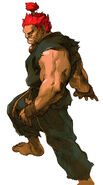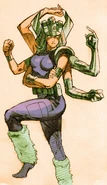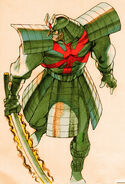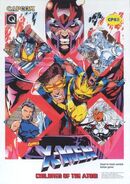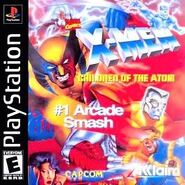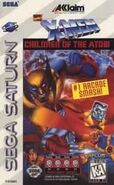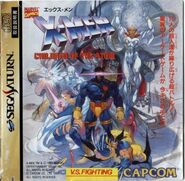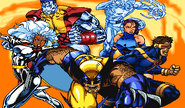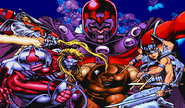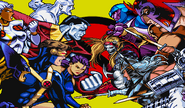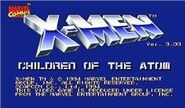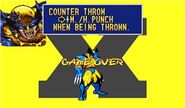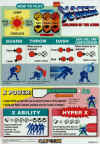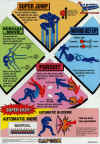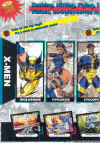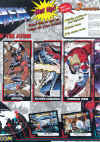No edit summary |
No edit summary Tag: Visual edit |
||
| (16 intermediate revisions by 12 users not shown) | |||
| Line 1: | Line 1: | ||
| + | {{DISPLAYTITLE:''X-Men: Children of the Atom''}} |
||
| ⚫ | |||
| + | {{Infobox game |
||
| + | | name = ''X-Men: Children of the Atom'' |
||
| + | | image = XCotA logo.png |
||
| + | | japanese = エックス・メン チルドレン オブ ジ アトム |
||
| + | | romaji = Ekkusu Men Chirudoren obu ji Atomu |
||
| + | | developer = [[Capcom]] |
||
| + | | publisher = Capcom |
||
| + | | platforms = Arcade, Sega Saturn, MS-DOS, PlayStation |
||
| + | | release = '''Arcade'''{{clear}} |
||
| + | <small>[[wikipedia:Japan|JP]]</small> December 8, 1994{{clear}} |
||
| + | <small>[[wikipedia:Asia|AS]]</small> December 17, 1994{{clear}} |
||
| + | <small>[[wikipedia:North America|NA]]</small> January 5, 1995{{clear}} |
||
| + | <small>[[wikipedia:Europe|EU]]</small> March 31, 1995{{clear}} |
||
| + | '''Sega Saturn'''{{clear}} |
||
| + | <small>[[wikipedia:Japan|JP]]</small> November 22, 1995{{clear}} |
||
| + | <small>[[wikipedia:North America|NA]]</small> April 6, 1996{{clear}} |
||
| + | <small>[[wikipedia:Europe|EU]]</small> 1996{{clear}} |
||
| + | '''PC'''{{clear}} |
||
| + | <small>[[wikipedia:North America|NA]]</small> May 31, 1997{{clear}} |
||
| + | <small>[[wikipedia:Europe|EU]]</small> 1997{{clear}} |
||
| + | '''PlayStation'''{{clear}} |
||
| + | <small>[[wikipedia:Europe|EU]]</small> February 1998{{clear}} |
||
| + | <small>[[wikipedia:North America|NA]]</small> November 1996{{clear}} |
||
| + | |genre = Fighting Game}} |
||
| ⚫ | '''''X-Men: Children of the Atom''''' is a fighting game developed and published by [[Capcom]] for the CP System II in Japan in 1994. It is the first fighting game produced by Capcom using characters under license from Marvel Comics, and is widely praised for its faithfulness in capturing the spirit of its namesake comics, by using colorful animation and voice actors from the X-Men animated series, such as Cathal Dodd as [[Wolverine]]. |
||
| + | |||
| + | The game was later released in other parts of Asia at the end of 1994, and North America and worldwide in 1995. It has since been re-released worldwide on the PlayStation, Sega Saturn, and MS-DOS. |
||
| + | |||
| + | The game is loosely based on the "[[w:c:marvel:Fatal Attractions|Fatal Attractions]]" storyline. Members of the X-Men set up a fighting tournament to determine who is strong enough to defeat the mutant supervillain [[Magneto]], who wishes to eliminate the human population from his space station Avalon in order to free the oppressed mutants. |
||
| + | |||
== Gameplay == |
== Gameplay == |
||
| + | ''X-Men: Children of the Atom'' follows the same controls and conventions as Capcom's ''Street Fighter'' video games, where the character selected has moves that can be executed by pressing the attack button and moving the joystick in specific positions such as "quarter-circle-forward". |
||
| − | The ultimate object of the game is to defeat the mutant supervillain [[Magneto]], who wishes to eliminate the human population from his space station Avalon in order to free the oppressed mutants. The player selects from members of the X-Men ([[Cyclops]], [[Psylocke]], Wolverine, [[Storm]], [[Colossus]] and [[Iceman]]), who have set up a fighting tournament to determine who is strong enough to challenge Magneto in battle. Unlike previous X-Men video games, ''Children of the Atom'' also allows players to helm popular X-Men villains who want their own personal gains from defeating Magneto; such as [[Omega Red]], the mutant hunting android [[Sentinel]], [[Spiral]] (lackey of Mojo), and [[Silver Samurai]]. [[Juggernaut]] is also included as a sub-boss and a lackey of Magneto. This game was released shortly after ''Super Street Fighter II Turbo'', the game that introduced the world to [[Akuma]]. As an in-joke to Super Turbo's Japanese title (''Super Street Fighter II X''), Akuma is included as a secret character and the secret final boss. The sub-boss and main boss, Juggernaut and Magneto, respectively, are not selectable in the arcade version of the game, but are selectable in the PC version. The game, along with ''SSFII Turbo'', is considered one of the first fighting games to popularize the now often-used ideas of super jumps, super combos, and Tech. Hit, which means that an attempted grab or throw can be negated by the opponent. However, a player must have at least a Level 2 Gauge (about half the total bar), and while some characters simply land on their feet or recover in mid-air (like Wolverine or Omega Red), other characters escape the throw entirely and a select few can even reverse the grapple (like Iceman). Furthermore, the game, along with it's sequel, [[Marvel Super Heroes]], was the precursor to the ''Marvel vs. Capcom'' series, with elements and characters from this game having been combined with ''Street Fighter Alpha'' to create ''[[X-Men vs. Street Fighter]]''. Ports of ''Children of the Atom'' were later released to Sega Saturn in 1995, PC in 1997, and PlayStation in 1998. |
||
| + | |||
| ⚫ | |||
| + | In addition to the six playable members of the X-Men, the game also allows players to control popular X-Men villains who want their own personal gains from defeating Magneto; such as [[Omega Red]] and [[Silver Samurai]]. [[Akuma]] was included as a secret character, as the game was released shortly after ''[[w:c:streetfighter:Super Street Fighter II Turbo|Super Street Fighter II Turbo]]''. |
||
| − | === X-Men === |
||
| + | |||
| − | * [[Colossus]] is the slowest, but strongest X-Men member. His attacks involve pummeling the opponent and taking advantage of his metal skin. His stage is |
+ | * [[Colossus]] is the slowest, but strongest X-Men member. His attacks involve pummeling the opponent and taking advantage of his metal skin. His stage is in the city under attack by the Sentinels. The first part takes place when they battle at the middle of the bridge. But when the bridge collapses, they land on a huge boat crossing alongside |
* [[Cyclops]] relies mainly on his optic blasts. He has a great amount of agility and has an uppercut move. His stage is the Danger Room. In the background of the stage, traps such as spikes appear, although these will not damage the player in any way. |
* [[Cyclops]] relies mainly on his optic blasts. He has a great amount of agility and has an uppercut move. His stage is the Danger Room. In the background of the stage, traps such as spikes appear, although these will not damage the player in any way. |
||
| − | * [[Iceman]] attacks his enemies with ice beams or ice balls. An interesting point is that he takes zero chipping damage when blocking a projectile attack. His stage is an |
+ | * [[Iceman]] attacks his enemies with ice beams or ice balls. An interesting point is that he takes zero chipping damage when blocking a projectile attack. His stage is an iceberg floor floating across a tropical beach, as the battle progresses the iceberg floormoves away from the beach. Characters will slide while standing still on the ice, making his stage slightly difficult to keep balance on. |
* [[Psylocke]], utilizes both Ninjutsu attacks and psionic blasts, with equal ease and speed. She also employs illusions, enabling sneak attacks. Her stage is an elevator moving around a skyscraper. This stage is somewhat similar to her stage in the game's [[Marvel Super Heroes|sequel]]. |
* [[Psylocke]], utilizes both Ninjutsu attacks and psionic blasts, with equal ease and speed. She also employs illusions, enabling sneak attacks. Her stage is an elevator moving around a skyscraper. This stage is somewhat similar to her stage in the game's [[Marvel Super Heroes|sequel]]. |
||
* [[Storm]] is the only X-Men member who can fly and mainly attacks with wind, ice and lightning-based attacks. Her stage is on top of the Blackbird. |
* [[Storm]] is the only X-Men member who can fly and mainly attacks with wind, ice and lightning-based attacks. Her stage is on top of the Blackbird. |
||
* [[Wolverine]] has moves related to his powerful brawling and clawing skills. He has great agility and can also heal part of his damage. His stage is the Savage Land. |
* [[Wolverine]] has moves related to his powerful brawling and clawing skills. He has great agility and can also heal part of his damage. His stage is the Savage Land. |
||
| ⚫ | * [[Omega Red]] mostly makes use of his tentacles, draining either the life- or X-energy or whipping them at the player. His stage is an undersea laboratory but once the glass from the elevator breaks due to deep underwater pressure, it immediately speeds it upward to prevent it, signifies that the match is decided. |
||
| − | === Villains === |
||
| ⚫ | |||
* [[Sentinel]] is the largest regular character. He is slow and awkward, but features a vast array of intimidating short- and long-range weaponry, and extremely powerful blows — Sentinel's normal moves inflict guard damage to blocking opponents. His stage is a Sentinel factory in Genosha. Master Mold, who is in the background, will either fly off or be destroyed depending on whether or not Sentinel wins. |
* [[Sentinel]] is the largest regular character. He is slow and awkward, but features a vast array of intimidating short- and long-range weaponry, and extremely powerful blows — Sentinel's normal moves inflict guard damage to blocking opponents. His stage is a Sentinel factory in Genosha. Master Mold, who is in the background, will either fly off or be destroyed depending on whether or not Sentinel wins. |
||
| − | * [[Silver Samurai]] features an array of |
+ | * [[Silver Samurai]] features an array of sword skills and energy shurikens. He can also use his mutant abilities to energize his sword in a vast array of ways. His stage is a Kodokan. |
| − | * [[Spiral]] uses her long, powerful six arms. |
+ | * [[Spiral]] uses her long, powerful six arms. Her stage has 4 different rooms and is unique because the floor can break up to 3 times(hits twice on the floor in order to break it), caused by a hard fall by an airborne character. |
| − | === Bosses === |
||
* [[Juggernaut]] is the first boss character which the player encounters after defeating six opponents. He is a slow, but very powerful character with huge range. Three blows dispose of almost any character. Not only is he extremely powerful, but it takes multiple hits to put him on the floor. He has a special armor that prevents him from being tripped or pushed back that is powered up even more by his Crimson Gem of Cyttorak power-up ability. His stage is a space ship launching bay. He is also arguably the first character in fighting games to use in-stage objects as weapons (the I-beams in the foreground). |
* [[Juggernaut]] is the first boss character which the player encounters after defeating six opponents. He is a slow, but very powerful character with huge range. Three blows dispose of almost any character. Not only is he extremely powerful, but it takes multiple hits to put him on the floor. He has a special armor that prevents him from being tripped or pushed back that is powered up even more by his Crimson Gem of Cyttorak power-up ability. His stage is a space ship launching bay. He is also arguably the first character in fighting games to use in-stage objects as weapons (the I-beams in the foreground). |
||
* [[Magneto]] is the final boss. He is capable of flight and is immensely powerful. In addition, his super bar fills automatically. As expected, his attacks are mainly revolved around his mastery of magnetism and electromagnetism. One ability allows him to manipulate ship fragments from the Blackbird, which is never seen in a later game. Another creates an invulnerable magnetic shield around him that protects him from virtually any attack; Magneto normally uses this attack when his health is low. His stage is Avalon, his space station. It is arguably the most spectacular stage of the whole game, featuring lush graphics, state-of-the-art 2D animation and fluid changes between different parts of the space station. |
* [[Magneto]] is the final boss. He is capable of flight and is immensely powerful. In addition, his super bar fills automatically. As expected, his attacks are mainly revolved around his mastery of magnetism and electromagnetism. One ability allows him to manipulate ship fragments from the Blackbird, which is never seen in a later game. Another creates an invulnerable magnetic shield around him that protects him from virtually any attack; Magneto normally uses this attack when his health is low. His stage is Avalon, his space station. It is arguably the most spectacular stage of the whole game, featuring lush graphics, state-of-the-art 2D animation and fluid changes between different parts of the space station. |
||
| ⚫ | * [[Akuma]] is very similar to his Super Street Fighter II Turbo incarnation. He is selectable via a code at the character select screen. He moves fast, his moves do big damage and he knows a fair few nasty combos and has powerful Super Moves, although he has low stamina compared to other characters. Like his SSFII Turbo incarnation, he uses attacks with spiritual energy (Hadou) and Ansatsuken style, he also uses ki manipulation to pass through the foe and also uses fire attacks. His stage is the Danger Room. Akuma can be available if X-Men: Children of the Atom is in Version 3.0. |
||
| − | === Secret Character === |
||
| + | |||
| ⚫ | * [[Akuma]] is very similar to his Super Street Fighter II Turbo incarnation. He is selectable via a code at the character select screen. He moves fast, his moves do big damage and he knows a fair few nasty combos and has powerful Super Moves, although he has low stamina compared to other characters.Like his SSFII Turbo incarnation, he uses attacks with spiritual energy (Hadou) and |
||
| + | The game, along with ''SSFII Turbo'', is considered one of the first fighting games to popularize the now often-used ideas of super jumps, super combos, and Technical Hit, which means that an attempted grab or throw can be negated by the opponent. However, a player must have at least a Level 2 Gauge (about half the total bar), and while some characters simply land on their feet or recover in mid-air (like Wolverine or Omega Red), other characters escape the throw entirely and a select few can even reverse the grapple (like Iceman). |
||
| + | |||
| + | Along with its sequel ''[[Marvel Super Heroes]]'', ''X-Men: Children of the Atom'' was the precursor to the ''Marvel vs. Capcom'' series, with elements and characters from this game having been combined with ''Street Fighter Alpha'' to create ''[[X-Men vs. Street Fighter]]''. |
||
=== Cameo Characters === |
=== Cameo Characters === |
||
| − | * [[Professor X]] appears in Colossus' ending and in the credits with the X-Men. |
+ | * [[Professor X]] appears in Colossus' ending and in the credits with the X-Men. Also appears in the Danger Room stage. |
* [[Mojo]] appears in Spiral's ending and Iceman does an ice sculpture of Mojo in his ending. |
* [[Mojo]] appears in Spiral's ending and Iceman does an ice sculpture of Mojo in his ending. |
||
* [[Phoenix]] appears in Cyclops' and Wolverine's endings. |
* [[Phoenix]] appears in Cyclops' and Wolverine's endings. |
||
* [[Forge]] appears in Storm's ending. |
* [[Forge]] appears in Storm's ending. |
||
| − | == |
+ | == Trivia == |
| + | * Some voice samples of Colossus, Silver Samurai and Juggernaut are used as attack moves for the secret character Akuma. |
||
| − | <gallery captionalign="center"> |
||
| + | * When you get to play as Akuma, the way the end credits from this game also uses the same way they did on Super Street Fighter II Turbo except they used dizzied character sprites of the characters defeated by him instead of portraits. |
||
| − | cyclopsz.png|Cyclops |
||
| + | |||
| − | wolvz.png|Wolverine |
||
| ⚫ | |||
| − | icemanz.png|Iceman |
||
| + | <gallery> |
||
| − | colossusz.png|Colossus |
||
| + | Mvc2-akuma.jpg |
||
| − | stormz.png|Storm |
||
| + | Magneto.png |
||
| − | psyz.png|Psylocke |
||
| + | Mvc2-juggernaut.jpg |
||
| − | silvz.png|Silver Samurai |
||
| + | Sentinel.png |
||
| − | omegaredz.png|Omega Red |
||
| + | Mvc2-spiral.jpg |
||
| − | spiralz.png|Spiral |
||
| + | Mvc2-silver-samurai.jpg |
||
| − | sentz.png|Sentinel |
||
| + | MVC2 Omega Red.png |
||
| − | juggz.png|Juggernaut |
||
| + | Wolverine.png |
||
| − | magz.png|Magneto |
||
| + | Mvc2-psylocke.jpg |
||
| − | Akumacota.png|Akuma |
||
| + | Storm.png |
||
| + | Mvc2-iceman.jpg |
||
| + | Mvc2-cyclops.jpg |
||
| + | Mvc2-colossus.jpg |
||
| + | </gallery> |
||
| + | |||
| + | == Gallery Part 02 (X-Men: COTA) == |
||
| + | <gallery> |
||
| + | XMCotA flyer.jpg|Arcade magazine |
||
XMCOTA_PSX_box.jpg|PlayStation Cover |
XMCOTA_PSX_box.jpg|PlayStation Cover |
||
XMCOTA_SAT_box.jpg|Sega Saturn Cover |
XMCOTA_SAT_box.jpg|Sega Saturn Cover |
||
| Line 59: | Line 100: | ||
xmen-cota-fly_small.jpg|Character Ad Part 3 |
xmen-cota-fly_small.jpg|Character Ad Part 3 |
||
xmen-cota-fly2_small.jpg|Character Ad Part 4 |
xmen-cota-fly2_small.jpg|Character Ad Part 4 |
||
| − | wolvie-atomlose.gif|Wolverine Lose Picture |
||
| − | psylocke-atomlose.gif|Psylocke Lose Picture |
||
| − | storm-atomlose.gif|Storm Lose Picture |
||
| − | iceman-atomlose.gif|Iceman Lose Picture |
||
| − | sentinal-atomlose.gif|Sentinel Lose Picture |
||
| − | Wolverine Blue.png|Wolverine Normal Panel |
||
| − | Psylocke Blue.png|Psylocke Normal Panel |
||
| − | Cyclops Blue.png|Cyclops Normal Panel |
||
| − | Storm Blue.png|Storm Normal Panel |
||
| − | Iceman Blue.png|Iceman Normal Panel |
||
| − | Colossus Blue.png|Colossus Normal Panel |
||
| − | Spiral Blue.png|Spiral Normal Panel |
||
| − | Silver Samurai Blue.png|Silver Samurai Normal Panel |
||
| − | Omega Red Blue.png|Omega Red Normal Panel |
||
| − | Sentinel Blue.png|Sentinel Normal Panel |
||
| − | Juggernaut Blue.png|Juggernaut Normal Panel |
||
| − | Magneto Blue.png|Magneto Normal Panel |
||
| − | Wolverine Yellow.png|Wolverine Yellow Screen Damage Panel |
||
| − | Psylocke Yellow.png|Psylocke Yellow Screen Damage Panel |
||
| − | Cyclops Yellow.png|Cyclops Yellow Screen Damage Panel |
||
| − | Storm Yellow.png|Storm Yellow Screen Damage Panel |
||
| − | Iceman Yellow.png|Iceman Yellow Screen Damage Panel |
||
| − | Colossus Yellow.png|Colossus Yellow Screen Damage Panel |
||
| − | Spiral Yellow.png|Spiral Yellow Screen Damage Panel |
||
| − | Silver Samurai Yellow.png|Silver Samurai Yellow Screen Damage Panel |
||
| − | Omega Red Yellow.png|Omega Red Yellow Screen Damage Panel |
||
| − | Sentinel Yellow.png|Sentinel Yellow Screen Damage Panel |
||
| − | Juggernaut Yellow.png|Juggernaut Yellow Screen Damage Panel |
||
| − | Magneto Yellow.png|Magneto Yellow Screen Damage Panel |
||
| − | Wolverine Red.png|Wolverine Red Screen Damage Panel |
||
| − | Psylocke Red.png|Psylocke Red Screen Damage Panel |
||
| − | Cyclops Red.png|Cyclops Red Screen Damage Panel |
||
| − | Storm Red.png|Storm Red Screen Damage Panel |
||
| − | Iceman Red.png|Iceman Red Screen Damage Panel |
||
| − | Colossus Red.png|Colossus Red Screen Damage Panel |
||
| − | Spiral Red.png|Spiral Red Screen Damage Panel |
||
| − | Silver Samurai Red.png|Silver Samurai Red Screen Damage Panel |
||
| − | Omega Red Red.png|Omega Red Red Screen Damage Panel |
||
| − | Sentinel Red.png|Sentinel Red Screen Damage Panel |
||
| − | Juggernaut Red.png|Juggernaut Red Screen Damage Panel |
||
| − | Magneto Red.png|Magneto Red Screen Damage Panel |
||
</gallery> |
</gallery> |
||
| − | {{ |
+ | {{TitleNavbox}} |
| + | {{GamesNavbox}} |
||
| + | {{XCOTANavbox}} |
||
| + | |||
[[Category:Games]] |
[[Category:Games]] |
||
| − | [[Category:X-Men: |
+ | [[Category:X-Men: Children of the Atom]] |
| + | |||
| + | [[es:X-Men: Children of the Atom]] |
||
| + | [[pt:X-Men: Children of the Atom]] |
||
Revision as of 21:01, 8 April 2020
X-Men: Children of the Atom is a fighting game developed and published by Capcom for the CP System II in Japan in 1994. It is the first fighting game produced by Capcom using characters under license from Marvel Comics, and is widely praised for its faithfulness in capturing the spirit of its namesake comics, by using colorful animation and voice actors from the X-Men animated series, such as Cathal Dodd as Wolverine.
The game was later released in other parts of Asia at the end of 1994, and North America and worldwide in 1995. It has since been re-released worldwide on the PlayStation, Sega Saturn, and MS-DOS.
The game is loosely based on the "Fatal Attractions" storyline. Members of the X-Men set up a fighting tournament to determine who is strong enough to defeat the mutant supervillain Magneto, who wishes to eliminate the human population from his space station Avalon in order to free the oppressed mutants.
Gameplay
X-Men: Children of the Atom follows the same controls and conventions as Capcom's Street Fighter video games, where the character selected has moves that can be executed by pressing the attack button and moving the joystick in specific positions such as "quarter-circle-forward".
In addition to the six playable members of the X-Men, the game also allows players to control popular X-Men villains who want their own personal gains from defeating Magneto; such as Omega Red and Silver Samurai. Akuma was included as a secret character, as the game was released shortly after Super Street Fighter II Turbo.
- Colossus is the slowest, but strongest X-Men member. His attacks involve pummeling the opponent and taking advantage of his metal skin. His stage is in the city under attack by the Sentinels. The first part takes place when they battle at the middle of the bridge. But when the bridge collapses, they land on a huge boat crossing alongside
- Cyclops relies mainly on his optic blasts. He has a great amount of agility and has an uppercut move. His stage is the Danger Room. In the background of the stage, traps such as spikes appear, although these will not damage the player in any way.
- Iceman attacks his enemies with ice beams or ice balls. An interesting point is that he takes zero chipping damage when blocking a projectile attack. His stage is an iceberg floor floating across a tropical beach, as the battle progresses the iceberg floormoves away from the beach. Characters will slide while standing still on the ice, making his stage slightly difficult to keep balance on.
- Psylocke, utilizes both Ninjutsu attacks and psionic blasts, with equal ease and speed. She also employs illusions, enabling sneak attacks. Her stage is an elevator moving around a skyscraper. This stage is somewhat similar to her stage in the game's sequel.
- Storm is the only X-Men member who can fly and mainly attacks with wind, ice and lightning-based attacks. Her stage is on top of the Blackbird.
- Wolverine has moves related to his powerful brawling and clawing skills. He has great agility and can also heal part of his damage. His stage is the Savage Land.
- Omega Red mostly makes use of his tentacles, draining either the life- or X-energy or whipping them at the player. His stage is an undersea laboratory but once the glass from the elevator breaks due to deep underwater pressure, it immediately speeds it upward to prevent it, signifies that the match is decided.
- Sentinel is the largest regular character. He is slow and awkward, but features a vast array of intimidating short- and long-range weaponry, and extremely powerful blows — Sentinel's normal moves inflict guard damage to blocking opponents. His stage is a Sentinel factory in Genosha. Master Mold, who is in the background, will either fly off or be destroyed depending on whether or not Sentinel wins.
- Silver Samurai features an array of sword skills and energy shurikens. He can also use his mutant abilities to energize his sword in a vast array of ways. His stage is a Kodokan.
- Spiral uses her long, powerful six arms. Her stage has 4 different rooms and is unique because the floor can break up to 3 times(hits twice on the floor in order to break it), caused by a hard fall by an airborne character.
- Juggernaut is the first boss character which the player encounters after defeating six opponents. He is a slow, but very powerful character with huge range. Three blows dispose of almost any character. Not only is he extremely powerful, but it takes multiple hits to put him on the floor. He has a special armor that prevents him from being tripped or pushed back that is powered up even more by his Crimson Gem of Cyttorak power-up ability. His stage is a space ship launching bay. He is also arguably the first character in fighting games to use in-stage objects as weapons (the I-beams in the foreground).
- Magneto is the final boss. He is capable of flight and is immensely powerful. In addition, his super bar fills automatically. As expected, his attacks are mainly revolved around his mastery of magnetism and electromagnetism. One ability allows him to manipulate ship fragments from the Blackbird, which is never seen in a later game. Another creates an invulnerable magnetic shield around him that protects him from virtually any attack; Magneto normally uses this attack when his health is low. His stage is Avalon, his space station. It is arguably the most spectacular stage of the whole game, featuring lush graphics, state-of-the-art 2D animation and fluid changes between different parts of the space station.
- Akuma is very similar to his Super Street Fighter II Turbo incarnation. He is selectable via a code at the character select screen. He moves fast, his moves do big damage and he knows a fair few nasty combos and has powerful Super Moves, although he has low stamina compared to other characters. Like his SSFII Turbo incarnation, he uses attacks with spiritual energy (Hadou) and Ansatsuken style, he also uses ki manipulation to pass through the foe and also uses fire attacks. His stage is the Danger Room. Akuma can be available if X-Men: Children of the Atom is in Version 3.0.
The game, along with SSFII Turbo, is considered one of the first fighting games to popularize the now often-used ideas of super jumps, super combos, and Technical Hit, which means that an attempted grab or throw can be negated by the opponent. However, a player must have at least a Level 2 Gauge (about half the total bar), and while some characters simply land on their feet or recover in mid-air (like Wolverine or Omega Red), other characters escape the throw entirely and a select few can even reverse the grapple (like Iceman).
Along with its sequel Marvel Super Heroes, X-Men: Children of the Atom was the precursor to the Marvel vs. Capcom series, with elements and characters from this game having been combined with Street Fighter Alpha to create X-Men vs. Street Fighter.
Cameo Characters
- Professor X appears in Colossus' ending and in the credits with the X-Men. Also appears in the Danger Room stage.
- Mojo appears in Spiral's ending and Iceman does an ice sculpture of Mojo in his ending.
- Phoenix appears in Cyclops' and Wolverine's endings.
- Forge appears in Storm's ending.
Trivia
- Some voice samples of Colossus, Silver Samurai and Juggernaut are used as attack moves for the secret character Akuma.
- When you get to play as Akuma, the way the end credits from this game also uses the same way they did on Super Street Fighter II Turbo except they used dizzied character sprites of the characters defeated by him instead of portraits.
Gallery Part 01 (Characters)
Gallery Part 02 (X-Men: COTA)
Template:TitleNavbox Template:GamesNavbox Template:XCOTANavbox

